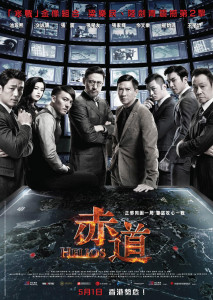Helios
赤道
Hong Kong/China, 2015, colour, 2.35:1, 119 mins.
Directors: Liang Lemin 梁乐民 [Longman Leung], Lu Jianqing 陆剑青 [Sunny Luk].
Rating: 4/10.
Poorly written nuclear-terrorism thriller too often falls back on easy cliches of Hong Kong action cinema.
Hong Kong, the present day. After the miniature nuclear device DC8, developed by South Korea’s military, is stolen by super-criminal Jin Taonian, aka Helios (Zhang Zhen), and his assistant Zhang Yijun (Wen Yongshan), the handover to a Middle East client (Mike Leeder) is set to take place in Hong Kong. However, the local Counter-Terrorism Response Unit, led by Li Yanming (Zhang Jiahui) and his assistant Fan Jiaming (Yu Wenle), is waiting and, during a motorbike chase, Helios drops the device. South Korean weapons expert Colonel Choi Min-ho (Ji Jin-heui) and National Intelligence Service agent Bak U-cheol (Choi Shi-weon) neutralise it and expect to be able to take it home; but Song An (Wang Xueqi), from China’s Security Bureau, orders the device to be held for the time being in Hong Kong under the provisions of the Basic Law. Song An also tells Li Yanming to hold the two South Koreans in CTRU’s HQ until the device is shipped out. Furious, Choi Min-ho and Bak  U-cheol start their own investigation to find Helios, though nobody knows his identity. Li Yanming visits Sophia (Gu Meihua), an arms dealer in Macau with links to Helios, but she’s shot by Zhang Yijun as he’s taking her in. After a fight, Li Yanming arrests Zhang Yijun. Meanwhile, Zhao Zhiren (Zhang Xueyou), a respected physics professor at Hong Kong University who is advising Li Yanming on the case, recommends the DC8 should be shipped out as soon as possible, to protect the territory from a potential nuclear apocalypse. Helios bombs a race course to force the police to return Zhang Yijun and the device. He also shoots some bomb experts who arrive from Beijing, as well as Song An’s assistant, Yuan Xiaowen (Feng Wenjuan), who goes to meet them. Li Yanming arranges for Zhang Yijun to be handed over to Helios but, en route, she slips away and also makes off with the DC8. It then turns out that CTRU may be chasing the wrong person.
U-cheol start their own investigation to find Helios, though nobody knows his identity. Li Yanming visits Sophia (Gu Meihua), an arms dealer in Macau with links to Helios, but she’s shot by Zhang Yijun as he’s taking her in. After a fight, Li Yanming arrests Zhang Yijun. Meanwhile, Zhao Zhiren (Zhang Xueyou), a respected physics professor at Hong Kong University who is advising Li Yanming on the case, recommends the DC8 should be shipped out as soon as possible, to protect the territory from a potential nuclear apocalypse. Helios bombs a race course to force the police to return Zhang Yijun and the device. He also shoots some bomb experts who arrive from Beijing, as well as Song An’s assistant, Yuan Xiaowen (Feng Wenjuan), who goes to meet them. Li Yanming arranges for Zhang Yijun to be handed over to Helios but, en route, she slips away and also makes off with the DC8. It then turns out that CTRU may be chasing the wrong person.
REVIEW
Following their hit police thriller Cold War 寒战 (2012), former art director Liang Lemin 梁乐民 [Longman Leung] and assistant director Lu Jianqing 陆剑青 [Sunny Luk] aim even higher with Helios 赤道, their second writer-director outing. Alas, like another Greek mythological figure, Icarus, the Hong Kong duo fly way too close to the sun: despite a few classy touches, this attempt at a big international nuclear terrorist thriller is holed by a pedestrian script, poor plotting and all the easy cliches that the territory’s film-makers still fall back on. With locations in Hong Kong, Seoul and Kyoto, dialogue in Cantonese, Mandarin, English and Korean, and a name cast drawn from Greater China and South Korea, the film oozes ambition but too often looks like a throwaway local production that’s not even trashy fun. At least Cold War sported a gripping first half before becoming more routine thereafter.
Like many productions of its kind, Helios simply has too many characters, with Hong Kongers, Mainlanders and South Koreans all jostling for space in the over-crowded screenplay about the hunt in Hong Kong for a stolen nuclear device developed by the Korean military. After a strong start, and some edgy moments as they’re sidelined by the Chinese authorities, the Korean characters – acceptably played by Ji Jin-heui 지진희 | 池珍熙 (The Old Garden 오래된 정원, 2006; Soo 수, 2007) and boybander-actor Choi Shi-weon 최시원 | 崔始源 (To the Fore 破风, 2015) – are pretty much rendered peripheral to the main show, to an extent that they increasingly seem to be in a different movie from the main Chinese cast. However, even among the latter, some roles hardly have time to register: the counter-terrorism agent of Hong Kong’s Yu Wenle 余文乐 [Shawn Yue] could easily be cut out, for a start.
Of the two Hong Kong leads, Zhang Xueyou 张学友 [Jacky Cheung], playing a tweedy professor, builds something of a character but the usually excellent Zhang Jiahui 张家辉 [Nick Cheung], as a counter-terrorism head, doesn’t have much to work with. Their best scenes are when they’re together, but Zhang Xueyou regularly eclipses his co-star. Taiwan’s Zhang Zhen 张震, as the apparent bad guy, is okay in his usual moody way, and Hong Kong actress-model Wen Yongshan 文咏珊 [Janice Man] (Nightfall, 2012) gives as good as she gets as his lithe assistant, especially in a knock-down, drag-out fight with Zhang Jiahui’s character in a Macau alley. But most are trumped by the film’s classiest performance, from smooth Mainland veteran Wang Xueqi 王学圻 (Forever Enthralled 梅兰芳, 2008; Sacrifice 赵氏孤儿, 2010) as the natty guy from Beijing’s Security Bureau who really gives the orders in Hong Kong.
After all the flag-waving in Cold War about Hong Kong being “Asia’s safest city”, and the pride and dedication of its police force, Helios takes almost the opposite line, showing the territory to be way open to terrorist abuse and its supine authorities basically taking their orders from Beijing. (Unlike Cold War, Helios is co-funded by China.) That’s all fine, but Liang and Lu don’t seem capable of translating this into a dramatically interesting screenplay. Tensions between Hong Kong, China and South Korea are referred to but not developed in any meaningful way that would get in the way of the popcorn entertainment, and the only surprise (apart from a major character twist) is the way in which some major roles are unexpectedly killed off.
Aside from Wang’s scenes in which his louche Beijing heavy calls the shots, the film lacks the tense character stand-offs that motored the first half of Cold War. Even more disappointingly, it has no real sense of Hong Kong being under any kind of nuclear threat, even though people keep talking about it, or at the mercy of a chaos-dealing super-criminal (as was so well conveyed in the 2013 Firestorm 风暴, for example). Liang and Lu seem content to fall back on local action-cinema staples (such as a well-mounted motorbike chase near the start) and the usual gaping plot holes, convenient story jumps and one-dimensional roles that still plague Hong Kong productions.
Technical credits are strong, and the propulsive symphonic score by Jin Peida 金培达 [Peter Kam] is one of his better ones, driving the well-staged setpieces. But inbetween the flashy bits, Helios is poorly written and even more poorly plotted for a big-budget production of this kind. A sequel is flagged in the final scene, and is actually in the works. The Chinese title means “equator”, signifying the heat in which Hong Kong supposedly finds itself. If only.
CREDITS
Presented by Media Asia Film Production (HK), Wanda Media (CN), Sun Entertainment Culture (HK), Sil-Metropole Organisation (HK), Long Motion Pictures (CN), Media Asia Film Distribution (Beijing) (CN). Produced by Blue Sea Productions (HK).
Script: Liang Lemin [Longman Leung], Lu Jianqing [Sunny Luk]. Photography: Guan Zhiyao [Jason Kwan]. Editing: Chen Zhongming, Huang Hai. Music: Jin Peida [Peter Kam]. Art direction: Mo Shaozong [Alex Mok]. Costume design: Wu Lilu [Dora Ng] (general), Xi Zhongwen [Yee Chung-man] (for Zhang Xueyou). Sound: Zeng Jingxiang [Kinson Tsang] , Li Yaoqiang. Action: Qian Jiale [Chin Ka-lok]. Visual effects: Yu Guoliang, Li Wenjun, Lin Junyu (Free D Workshop).
Cast: Zhang Xueyou [Jacky Cheung] (Zhao Zhiren, professor), Zhang Jiahui [Nick Cheung] (Li Yanming/Eric), Zhang Zhen (Jin Taonian/”Helios”), Yu Wenle [Shawn Yue] (Fan Jiaming), Wang Xueqi (Song An), Wen Yongshan [Janice Man] (Zhang Yijun, Helios’ assistant), Ji Jin-heui (Choi Min-ho, South Korean colonel), Choi Shi-weon (Bak U-cheol, NIS agent), Yun Jin-i (Shin Mi-gyeong, NIS agent in Hong Kong), Gu Meihua [Josephine Koo] (Sophia), Feng Wenjuan (Yuan Xiaowen, Song An’s assistant), Lee Tae-ran (Choi Min-ho’s wife), Kim Hae-suk (South Korean president), Zhu Qianxue (Tracy, anti-terrorist SWAT member), Paul Fonoroff (Martin Koo), Mike Leeder (Mr. Big).
Premiere: Beijing Film Festival (closing film), 23 Apr 2015.
Release: China, 30 Apr 2015; Hong Kong, 1 May 2015.
